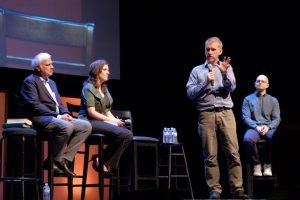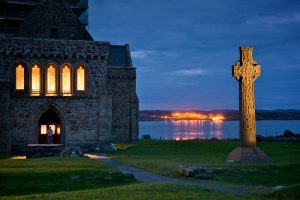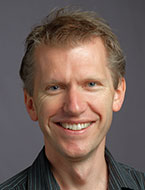After a recent talk I had given at Aberdeen University on “The Evidence for the Resurrection” a student approached me and asked if I had a moment. As we chatted, he explained how he had been raised in a Christian home, but had abandoned his faith as a teenager because he had concluded that faith, as Mark Twain quipped, “Is believing things you know ain’t so”. He looked at me thoughtfully and then said quietly, “Your talk today has deeply unsettled me. Nobody ever told me there were reasons to believe that Christianity might be true. I think I may need to rethink some things.” He signed up for the Alpha Course.
Wherever I go in Scotland or further afield, I find people are incredibly interested in questions about God, faith, and spirituality and not just on university campuses. In the last few months, I’ve had the privilege of speaking at pub events packed to overflowing as we’ve looked at topics ranging from “Where is God in Aleppo?” to “Can Life Have Meaning Without God?” to “How Can I Believe in Jesus When the Church is So Evil?” There’s no shortage of interest.
At the same t ime, though, Christians often seem ever less equipped to answer these kinds of questions in a way that engages people. Churches sometimes struggle to help people make the connection between the Bible and the world of work and culture. And if we’re honest, sometimes it’s easier to hide behind our church doors (or spend our time and energy taking pot-shots at other denominations, rather than pouring it into evangelism).
ime, though, Christians often seem ever less equipped to answer these kinds of questions in a way that engages people. Churches sometimes struggle to help people make the connection between the Bible and the world of work and culture. And if we’re honest, sometimes it’s easier to hide behind our church doors (or spend our time and energy taking pot-shots at other denominations, rather than pouring it into evangelism).
Scotland fascinates me as a country because it secularised so rapidly—rather like Quebec, the province in Canada (a country that was home for six years), where it seemed that the established church collapsed almost overnight in the ‘Quiet Revolution’ during the late 1970s. Secularism raises challenges—not just the tough questions it asks—but also because it encourages Christians to privatise their Christianity, retreating from the public square.
I moved to Scotland because I enjoy a challenge. But also because I see God at work here in so many ways. In the year since I moved here, I have been tremendously encouraged by the green shoots of growth I keep seeing—churches that are growing, people from all kinds of backgrounds who have met Christ, from businesspeople to students to asylum seekers, people of all ages and backgrounds. Scotland is an exciting place to be in Christian ministry.
Scotland is also exciting because of the significant role it played in the history of Christianity in this sceptred isle. In the sixth century, when Irish monks planted monasteries in places like Iona, from which missionaries would later set out for Northern England, a flame was lit that is still burning almost 1,500 years later. By God’s grace, I believe the gospel doesn’t just have a long history here, but a bright future, too.
But for that to be the case, we need to rediscover afresh the public face of a Christianity, a gospel that is bold and persuasive, that engages people’s questions, that believes Jesus belongs in the marketplace and the university as much as the church and the home. We need churches and Christians that are passionate and equipped—and to help do that is why the Solas Centre for Public Christianity was launched, seven years ago.
the university as much as the church and the home. We need churches and Christians that are passionate and equipped—and to help do that is why the Solas Centre for Public Christianity was launched, seven years ago.
I am hugely encouraged by what is happening here in Scotland, by what God is doing across and through the many gospel-centred churches from many denominations. There are challenges here, for sure, but what opportunities! Yes, we face a secular, increasingly pagan culture. But look at the Book of Acts—where we see the gospel spread like wildfire through a very similar culture. In three hundred years, Christians went from 0.001% to over 50% of the Roman Empire. Could we, just maybe, imagine God beginning a similar move again today?
Last month, I drove across the new Queensferry Crossing for the first time. It’s amazing what £1.35 billion will buy you. As I drove, I reflected that just as rivers need new crossings from time to time, so does the Church and the culture. We need to find new ways of engaging old questions and of showing that the gospel always has something to say to a culture, especially one that is so confused and riven as ours is. I’m exciting about the opportunity, through coming here to Scotland and joining Solas, to serve the Scottish church in the task of persuasive evangelism, bridging the Church and the public square.
Resources
If you haven’t yet discovered the Solas Centre for Public Christianity, check out our website and also our Facebook page. Among our many resources, look out for Solas Magazine (a fantastic resource helping Christians think about the big issues of the day from a Christian perspective), SHORT/ANSWERS (a series of four minute videos that address major questions about Christianity in a friendly, accessible way). The Solas team are also available for evangelistic events and training events—contact the Solas office (01382 525021 or office@solas-cpc.org) to find out more about Solas might be a resource for you.
______________________________________________________________________________
Dr. Andy Bannister is the Director of the Solas Centre for Public Christianity and an Adjunct Speaker with Ravi Zacharias International Ministries. He’s also a part of St Peters Free Church.
December 2017

